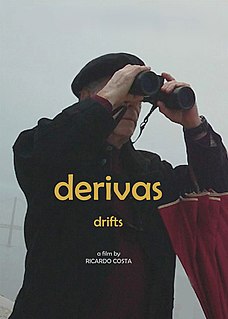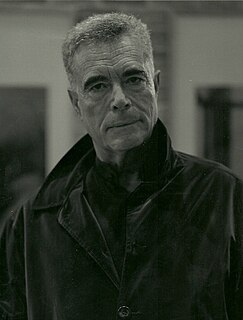
The dérive is a revolutionary strategy originally put forward in the "Theory of the Dérive" (1956) by Guy Debord, a member at the time of the Letterist International. Debord defines the dérive as "a mode of experimental behavior linked to the conditions of urban society: a technique of rapid passage through varied ambiances." It is an unplanned journey through a landscape, usually urban, in which participants drop their everyday relations and "let themselves be drawn by the attractions of the terrain and the encounters they find there". Though solo dérives are possible, Debord indicates
that the most fruitful numerical arrangement consists of several small groups of two or three people who have reached the same level of awareness, since cross-checking these different groups' impressions makes it possible to arrive at more objective conclusions.

Instituto Superior Técnico is a public school of engineering and technology, part of Universidade de Lisboa. It was founded as an autonomous school in 1911, and integrated in the Universidade Técnica de Lisboa in 1930. IST is the largest school of engineering in Portugal by number of enrolled students. It's considered one of the most prestigious engineering schools in Europe.

The Cinema of Portugal started with the birth of the medium in the late 19th century. Cinema was introduced in Portugal in 1896 with the screening of foreign films and the first Portuguese film was Saída do Pessoal Operário da Fábrica Confiança, made in the same year. The first movie theater opened in 1904 and the first scripted Portuguese film was O Rapto de Uma Actriz (1907). The first all-talking sound film, A Severa, was made in 1931. Starting in 1933, with A Canção de Lisboa, the Golden Age would last the next two decades, with films such as O Pátio das Cantigas (1942) and A Menina da Rádio (1944). Aniki-Bóbó (1942), Manoel de Oliveira's first feature film, marked a milestone, with a realist style predating Italian neorealism by a few years. In the 1950s the industry stagnated. The early 1960s saw the birth of the Cinema Novo movement, showing realism in film, in the vein of Italian neorealism and the French New Wave, with films like Dom Roberto (1962) and Os Verdes Anos (1963). The movement became particularly relevant after the Carnation Revolution of 1974. In 1989, João César Monteiro's Recordações da Casa Amarela won the Silver Lion at the Venice Film Festival and in 2009, João Salaviza's Arena won the Short Film Palme d'Or at the Cannes Film Festival. Several other Portuguese films have been in competition for major film awards like the Palme d'Or and the Golden Bear. João Sete Sete (2006) was the first Portuguese animated feature film. Portuguese cinema is significantly supported by the State, with the government's Instituto do Cinema e do Audiovisual giving films financial support.

Fernão Lopes was a Portuguese chronicler appointed by King Edward of Portugal. Fernão Lopes wrote the history of Portugal, but only a part of his work remained.
The Portuguese Mathematical Society (SPM) is a Portuguese institution, founded on December 12, 1940, whose objectives are the development of education and the dissemination and promotion of mathematical research in Portugal. SPM is responsible for the edition of scientific journal Portugaliæ Mathematica, Boletim SPM, Gazeta de Matemática and several books. Its activities include the organization of congresses, conferences, scientific meetings and training courses for teachers. SPM organizes the Portuguese Mathematical Olympiad and it also promotes the television show "This is mathematics", broadcast on SIC Notícias and SIC International. It brings together teachers and math researchers interested in the progress of the discipline in the country.

In Vanda's Room is a docufiction film by Portuguese director Pedro Costa.

Docufiction, often confused with docudrama, is the cinematographic combination of documentary and fiction, this term often meaning narrative film. It is a film genre which attempts to capture reality such as it is and which simultaneously introduces unreal elements or fictional situations in narrative in order to strengthen the representation of reality using some kind of artistic expression.
Ethnofiction is a neologism which refers to an ethnographic docufiction, a blend of documentary and fictional film in the area of visual anthropology. It is a film type in which, by means of fictional narrative or creative imagination, often improvising, the portrayed characters (natives) play their own roles as members of an ethnic or social group.
António Campos was one of the pioneer filmmakers of visual anthropology in Portugal. Mainly using pure documentary techniques, he shot ethnographic films and tried docufiction. As well as in fictional films, he used the methods of direct cinema to portrait the life of ancient human communities (ethnofiction) of his country.
Diogo Fernandes Pereira, sometimes called simply Diogo Fernandes, was a Portuguese 16th-century navigator, originally from Setúbal, Portugal. Diogo Fernandes was the first known European captain to visit the island of Socotra in 1503 and the discoverer of the Mascarenes archipelago in 1507. He may also have been the first European to sail east of Madagascar island.
Jorge Ferreira Chaves was a Portuguese architect.
Pêro de Ataíde or Pedro d'Ataíde, nicknamed O Inferno (Hell), was a Portuguese sea captain in the Indian Ocean active in the early 1500s. He was briefly captain of the first permanent Portuguese fleet in the Indian Ocean, taking over from Vicente Sodré, and the author of a famous letter giving an account of its fate.

Dom Duarte de Menezes, was a 15th-century Portuguese nobleman and military figure. Duarte de Menezes was the 3rd Count of Viana do Alentejo, 2nd Count of Viana, Lord of Caminha and the first Portuguese captain of Alcácer-Ceguer.

The Lisbon Theatre and Film School of the Polytechnic Institute of Lisbon inherited the function of the National Conservatoire, founded by Almeida Garrett, in 1836, and of teaching Film, introduced in the same establishment since 1971. The main goal of the Lisbon Theatre and Film School is training in the fields of Theatre and Cinema. Sometimes it is still referred to by its former designation "Conservatório Nacional". It is a public institution of higher education created in Lisbon but now located in Amadora, Portugal.
Sophia de Mello Breyner Andresen is a black-and-white 1969 Portuguese documentary film by João César Monteiro, then using the name João César Santos, about the notable poet. It was Monteiro's first completed film. It is dedicated to the memory of Carl Theodor Dreyer.
The 2014 Prémio Autores was the fifth edition of the Prémio Autores. It took place on 8 May 2014 at the Salão Nobre dos Paços do Concelho of the Câmara Municipal of Lisbon, Portugal.

Mists (Brumas), 2003, is a Portuguese feature film by Ricardo Costa. It Is the first of a sequel docufiction trilogy entitled Faraways (Longes). The second one is Drifts (Derivas) and the third one Cliffs (Arribas)


















